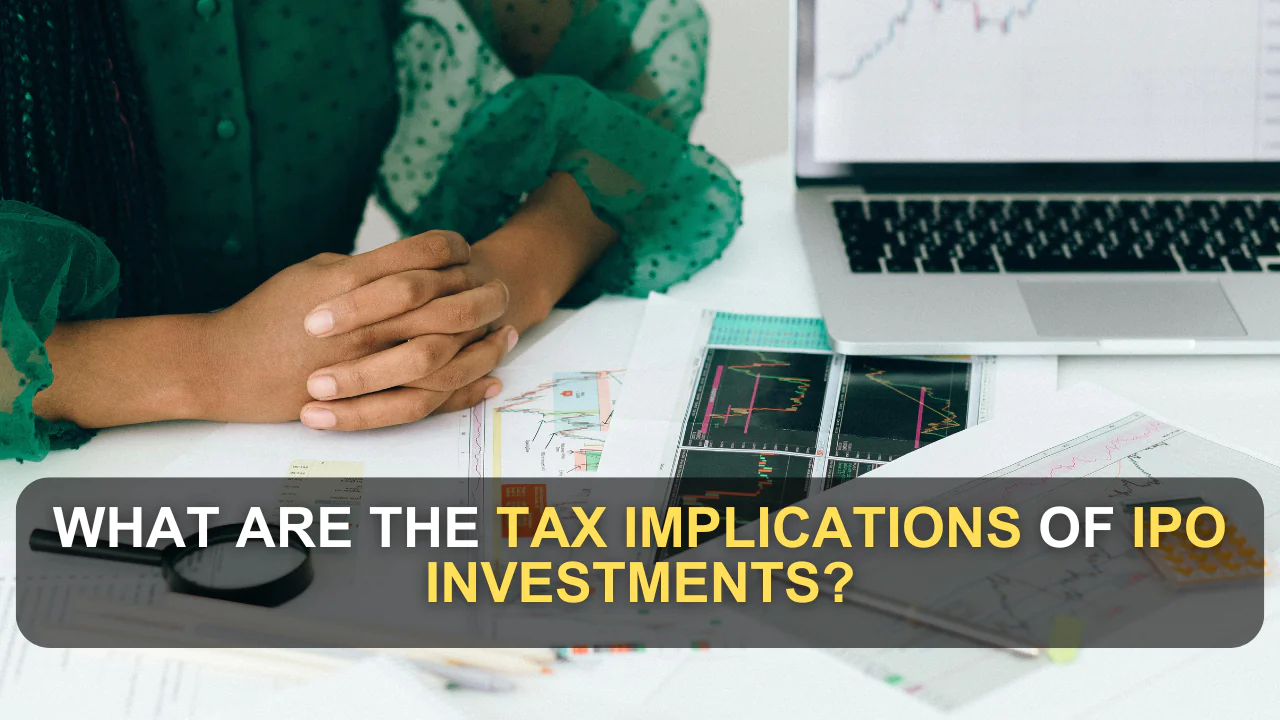Evaluating IPOs is an interesting activity for many traders or investors. IPO is the process through which a company sells equities to the public and this mobile more often than not benefits early shareholders. However, one often becomes enchanted with such fabulous opportunities and it’s equally crucial to examine the tax consequences of IPO stakes. When it comes to taxes they can severely cut down your profits and hence it is important to understand the rules and regulations.
Table of Contents
Understanding IPO Investments
IPO in the world of investing means that when you invest in an IPO, you are buying shares of stock from a company that is issuing shares for the first time. Listing means the issuing of equities to investors and these investors expect massive returns post-listing but with these returns comes taxing.
The tax treatment of IPO investments depends on the following;/The holding period /The type of returns from the investments, whether capital gains or income. It may be observed that short-term and long-term investors are not charged in a similar way on taxation considerations. Consequently, it is important to understand how this tax system of IPO investments functions.
Capital Gains Tax on IPOs
When you make your IPO shares sell for a profit, the profit that you make is a capital gain, which attracts capital gain tax. The rate at which your capital gain is taxed depends on the holding period:
- Short-Term Capital Gains (STCG): If you dispose of the shares in a year from the date of its allotment, then income so earned will be called short-term capital gains. For most cases, STCG from equity investments is subject to taxation at 15% of the requisites of the income. However, there can be an addition of such surcharges and cess, which will make the total taxes slightly more than the sub-total figures.
- Long-Term Capital Gains (LTCG): Where the shares are sold after a year or more, the gains made are considered capital gains in the long run. By the Indian tax laws when any person earns LTCG more than ₹ 1, 00,000 in any financial year, they are required to pay 10% of the excess amount as taxes without taking the benefits of indexing. The analysis established that any capital gains of up to ₹1 Lakh are tax-free; therefore, it is beneficial for long-term investors.
Example:
Supposing you bought ₹50,000 worth of stocks in IPO and after 1.5 years, your amount becomes ₹2,00,000. Your profit is ₹1,50,000. From this ₹, 50000 would be tax exempted and on the balance ₹100000 you would pay a tax at the rate of 10%, which would amount ₹ 10000.
Dividends and Their Taxation
Most organizations have a practice of paying dividends to their shareholders. Before the abolition of DDT, dividends were even tax-free in the hands of the investor, the company used to bear the tax. However, starting in 2020, dividends form part of the trader’s income, and it is subjected to the prevailing income tax rate. This change makes it possible for investors with the highest level of income to part with a huge amount of tax on the income from dividends.
In this section, we have given an analysis of TDS on Dividends under the chapter Tax Deducted at Source.
The TDS at 10% has to be withheld from the dividends where the resident investors are concerned with the total amount equal or exceeding to ₹ 5000/-. Non-resident investors have a TDS rate of 20%. If your total income is below the taxable limit you can report TDS deducted from your dividends and claim for refund from the Income tax department by filing your income tax return.
Taxes on Bonus and Rights issues arising from IPOs
At some point, companies offer bonuses or rights shares to the shareholders. While these shares are not taxed at the time of allotment, the taxation comes into play when they are sold:
- Bonus Shares: Also when you sell bonus shares the cost of the shares is considered to be zero, this therefore means that. This is because the wholesale amount is taxed as capital gains whether short-term or long term depending on the holding period.
- Rights Shares: Where rights shares are issued, the purchase price is used as the cost of acquisition of the shares. As with any other equity investments, profits from the sale of rights shares will be taxed under either STCG or LTCG regime depending on the duration of holding.
Selected Strategies for IPO Taxation
Knowledge of tax consequences enables investors in an IPO to apply certain tactics that would reduce taxes paid. The following are some useful tactics to think about:
Holding Period Management
The holding period is perhaps one of the easiest strategies available to avoid taxes on an IPO investment. Some investors are lucky enough to invest in stocks for more than a year hence they can take advantage of lower long-term capital gains tax. Whenever you predict a price decline or need cash, consider whether the early sale will return you a positive net profit after taxes.
Utilizing Exemptions
As that amount of long-term capital gains is tax-free, one has to strategize in a way that the total amount of capital gains to be made in that financial year is less than or equal to ₹ 1 lakh. It may maybe pronounced for people who use more than one investment plan or possess several types of investments. For instance, if you’ve made nearly ₹1 lakh from various stocks including IPOs, you might decide to sell some stocks and retain some that may have a better probable value in the future.
Set-Off of Losses
Even if you made a loss on any investment, you are allowed to use this as credit whenever you realize gains. For instance, if you lose money on IPO stock investment, such loss can be utilized to offset your taxable gains from the sale of other stocks such as blue-chip stocks, bonds, or mutual funds.
- Short-Term Losses: These losses are allowed to be set off against both revenue and other capital gains arising within the short term as well as the other capital losses even if they were arising in the long term.
- Long-Term Losses: Long-term capital losses can only be adjusted against other long-term capital Profession allowing carrying forward of losses is considered as one of the unique taxation features of Indian income tax.
Direct Investing in Tax Sheltered Plans
For long-term investment policy, you can invest through PPF or EPF where your earnings will not be taxable. Although IPO investments are made in a normal brokerage account, some retirement accounts may permit investment in stocks including IPOs with special tax benefits.
Reporting IPO Investments
The last, but not least important component of dealing with taxes connected to IPO investment is reporting. The Income Tax Department expects investors to declare their income from capital gains, be it from profits in IPO investments or any other. These seem to trigger penalties or interest on any unpaid taxes about such other incomes not reported correctly.
Steps for Reporting:
- Maintain Records: Document all your IPO investments with corresponding dates of purchase and sale as well as the correct acquisition cost.
- Calculate Gains: Before you begin filing your ITR, it’s a good idea to compute your total short-term capital gains and long-term capital gains individually.
- Use Correct ITR Form: In filing for an ITR, make sure that the correct form of ITR that allows capital gains computation is used. In the case of individuals and HUF, the return can be filed using ITR-2 or ITR-3.
- Claim Deductions: Do not leave out any profit or loss that you wish to forward or offset against the profit or loss to be made. This can help you to minimize the amount of taxes that you are likely to pay.
Effects of Market Fluctuations on Tax Commitments
Overall IPO market can experience lots of fluctuations and actual market movements influence the amounts you get in terms of investment and taxes. For example, if you sell an IPO share in business during more down moments in stock markets you might end up selling at a loss and thus affect your tax condition of that specific financial year.
Also, note any changes in the tax legislation since governments often change policies governing CAP or dividend taxation. By being aware of changes in these areas, you will be better positioned to change your investing commensurately.
Conclusion
IPO trading is a good investment because it allows one to scoop a company at the bottom of its price range, hence the need to understand and sometimes avoid the taxes bounding this area. It is essential to learn how capital gains tax works, and how to extend your holding periods, reduce your exemptions, and report your investments properly to reduce taxes and increase revenue. Therefore, when investing you should understand the tax laws and how to implement,k strategies thus improving on your investment experience and at the same time observing, tax laws and uncovering any regulatory changes.
When you are planning on joining the IPO market remember this, tax planning is one way of boosting your returns on investments and retaining as much of your money as you can. Whether you are a beginner investor or already making your fifth investment, you are sure to benefit from the time taken to understand the tax systems.




